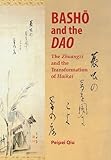Basho and the Dao : The Zhuangzi and the Transformation of Haikai / Peipei Qiu.
Material type: TextPublisher: Honolulu : University of Hawaii Press, [2005]Copyright date: ©2005Description: 1 online resource (264 p.)Content type:
TextPublisher: Honolulu : University of Hawaii Press, [2005]Copyright date: ©2005Description: 1 online resource (264 p.)Content type: - 9780824828455
- 9780824861575
- 299.5/1482 22
- BL1900.C576 Q253 2005eb
- online - DeGruyter
- Issued also in print.
| Item type | Current library | Call number | URL | Status | Notes | Barcode | |
|---|---|---|---|---|---|---|---|
 eBook
eBook
|
Biblioteca "Angelicum" Pont. Univ. S.Tommaso d'Aquino Nuvola online | online - DeGruyter (Browse shelf(Opens below)) | Online access | Not for loan (Accesso limitato) | Accesso per gli utenti autorizzati / Access for authorized users | (dgr)9780824861575 |
Frontmatter -- Contents -- Foreword -- Acknowledgments -- General Notes -- Introduction -- Chapter 1. Encountering the Zhuangzi -- Chapter 2. From Falsehood to Sincerity -- Chapter 3 .Bashô's Fûkyô and the Spirit of Shôyôyû -- Chapter 4. Bashô's Fûryû and Daoist Traits in Chinese Poetry -- Chapter 5. Following Zôka and Returning to Zôka -- Epilogue -- Notes -- Glossary -- Selected Bibliography -- Index of Haikai Verses Cited -- Index -- About the Author
restricted access online access with authorization star
http://purl.org/coar/access_right/c_16ec
Although haiku is well known throughout the world, few outside Japan are familiar with its precursor, haikai (comic linked verse). Fewer still are aware of the role played by the Chinese Daoist classics in turning haikai into a respected literary art form. Bashō and the Dao examines the haikai poets' adaptation of Daoist classics, particularly the Zhuangzi, in the seventeenth century and the eventual transformation of haikai from frivolous verse to high poetry. The author analyzes haikai's encounter with the Zhuangzi through its intertextual relations with the works of Bashō and other major haikai poets, and also the nature and characteristics of haikai that sustained the Zhuangzi's relevance to haikai poetic construction. She demonstrates how the haikai poets' interest in this Daoist work was rooted in the intersection of deconstructing and reconstructing the classical Japanese poetic tradition. Well versed in both Chinese and Japanese scholarship, Qiu explores the significance of Daoist ideas in Bashō's and others' conceptions of haikai. Her method involves an extensive hermeneutic reading of haikai texts, an in-depth analysis of the connection between Chinese and Japanese poetic terminology, and a comparison of Daoist traits in both traditions. The result is a penetrating study of key ideas that have been instrumental in defining and rediscovering the poetic essence of haikai verse. Bashō and the Dao adds to an increasingly vibrant area of academic inquiry-the complex literary and cultural relations between Japan and China in the early modern era. Researchers and students of East Asian literature, philosophy, and cultural criticism will find this book a valuable contribution to cross-cultural literary studies and comparative aesthetics.
Issued also in print.
Mode of access: Internet via World Wide Web.
In English.
Description based on online resource; title from PDF title page (publisher's Web site, viewed 02. Mrz 2022)


